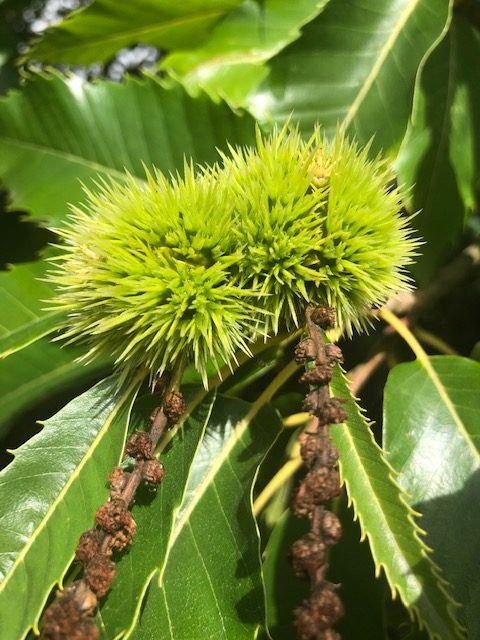
Sometimes the plants tell me things, which I have to research to double check, and this is such a story. Please brace yourself because it has quite a sexy content.
When I used to walk in Richmond Park, at certain times of the year, I noticed that the breeze carried a strong scent of semen, which piqued my curiosity. Following my nose, and it brought me to a grove of Sweet Chestnut (Castanea sativa) trees in bloom. Later in the year, I noticed that when the deer are in rut, they always gathered under the Sweet Chestnut trees. Of course, these nuts are a valuable food source to deer, but I couldn’t shake the question whether Sweet Chestnuts might be a masculine fertility tonic. Look at the shape of the nuts hanging off the tree, and you can’t help making a certain association.
Finally, I have found a study which demonstrated that the sugars within sweet chestnuts significantly increased sperm motility (by 4 fold), sperm concentration (by 12 fold), improves the seminiferous tubule, and the testicular micro-environment to rescue the development of sperm. So, if you are struggling with quality of sperm, do eat sweet chestnuts.(1)
Now Horse Chestnuts (Aesculus hippocastanum) also help men. About one in six men have varicocele, an uncomfortable condition caused by congestion and inflammation of veins of the scrotum, which also affects fertility. The anti-inflammatory and vein toning flavonoids in the Horse Chestnuts, help to reduce the size of the varicocele, and they have been shown to improve the density, motility and quality of sperm in those with varicocele induced infertility.
(1)^ Yu S, Zhao Y, Zhang FL, Li YQ, Shen W, Sun ZY. Chestnut polysaccharides benefit spermatogenesis through improvement in the expression of important genes. Aging (Albany NY). 2020 Jun 21;12(12):11431-11445. Epub 2020 Jun 21. PMID: 32568099; PMCID: PMC7343452. doi: 10.18632/aging.103205
